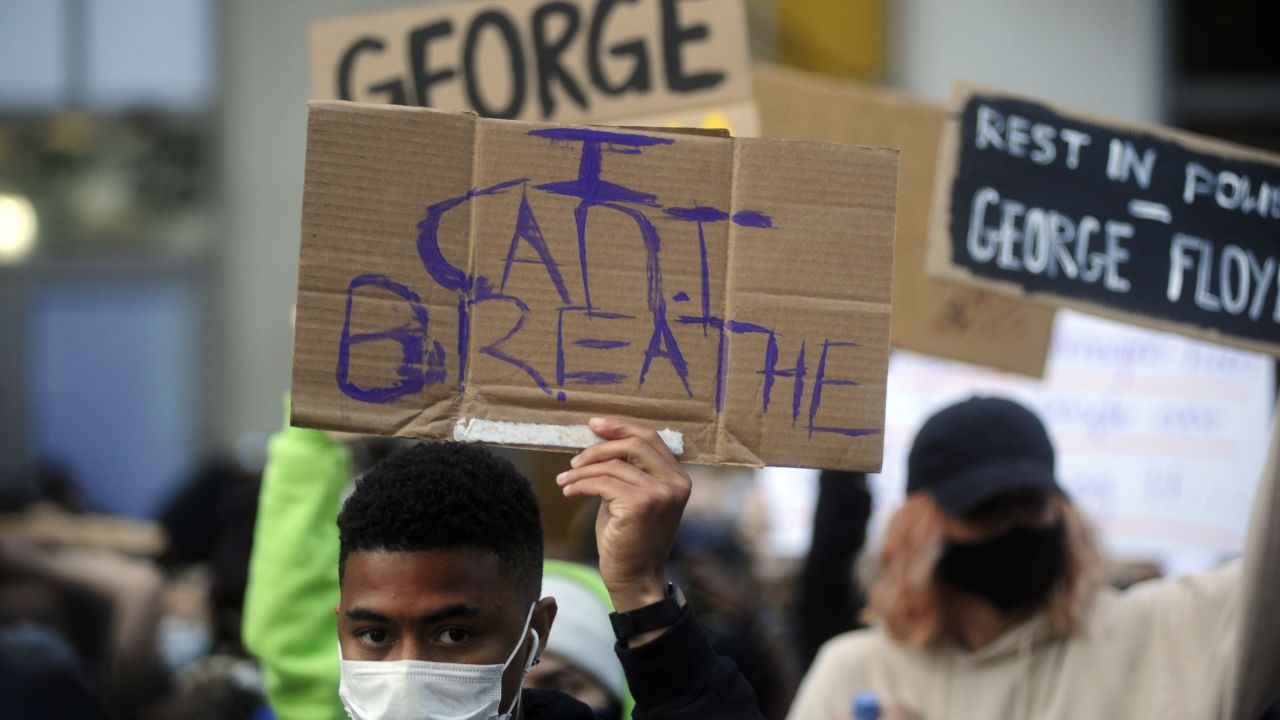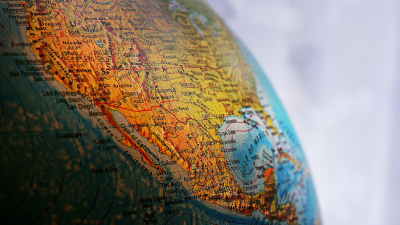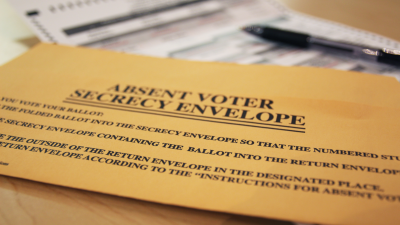
OAKLAND, USA - MAY 29: Protestors showed up in downtown Oakland to show solidarity with the protestors following the death of George Floyd in Minneapolis, Minnesota on May 29, 2020. A little after 9 PM the Oakland Police issued an unlawful assembly order and began using tear gas to disperse the crowd. Several businesses in the city hall complex area were broken into. (Photo by Neal Waters/Anadolu Agency via Getty Images)
“The old world is dying, and the new world struggles to be born: now is the time of monsters.”
America feels completely chaotic today. Protesters are marching in major cities, sometimes looting; police appear to be attacking them and the journalists covering the protests. Rather than calming the situation, the president has thrown gasoline on the fire, which escalated yesterday’s fight with Twitter. Trump launched a blistering verbal attack on China and announced that the United States is withdrawing from the World Health Organization in the midst of a deadly pandemic. Meanwhile, new information suggests that the Trump administration did, indeed, collude with Russia.
George Floyd is dead. So is Breonna Taylor. And so are more than 100,000 victims of a deadly pandemic.
The news is overwhelming. It is designed to be overwhelming.
This sort of chaos and confusion destabilizes society. In that confusion, as tempers run hot, people who are desperate for certainty return to old patterns and divide along traditional lines. Many are willing to accept a strong leader who promises to restore order, or simply are so distracted and discouraged they stop caring what their leaders do. They simply hunker down and try to survive.
As cities across the country erupted in protest last night over the murder of George Floyd and everything that deadly demonstration of white male dominance over another human’s life symbolized, Trump tweeted: “….These THUGS are dishonoring the memory of George Floyd, and I won’t let that happen. Just spoke to Governor Tim Walz and told him that the Military is with him all the way. Any difficulty and we will assume control but, when the looting starts, the shooting starts. Thank you!”
Twitter slapped a warning on the tweet, noting that it “violated the Twitter Rules about glorifying violence.” In response, the official White House twitter account retweeted what Trump had written… and Twitter slapped a warning on that, too. This is the first time Twitter has attached such a notice to any public figure’s tweets.
This afternoon, Trump appeared briefly in the Rose Garden not to address the protests, but to attack China and to announce he was withdrawing the U.S. from the WHO.
Trump accused China of a slew of misdeeds, including espionage and economic warfare, and called China an existential threat. He promised to ban certain Chinese nationals from the U.S., but identified no concrete measures he’s planning to take.
It seems Trump has decided his best bet for reelection is to use China as a foil. He is trying to blame China for America’s mounting coronavirus deaths, which is his excuse for withdrawing from the WHO, over which he insists China has “total control.” (This is false; the WHO has 194 member states, and until now, we were a leading partner in it.) He left without taking any questions.
Trump’s withdrawal from the WHO removes America from yet another international partnership. This horrified doctors and epidemiologists. Health researcher Dr. Atul Gawande called it a “disaster.” “I can’t imagine a worse thing to do in the midst of a pandemic and ongoing work to fight back TB, HIV, polio, and other health threats,” he tweeted. Former National Security Advisor Susan Rice agreed: “Unspeakably stupid and self-defeating.”
Defense technology journalist Kelsey D. Atherton made a different, and quite crucial, point. “[M]aybe the weirdest thing about the right’s strategy of quitting international institutions is they were built, expressly, to give the United States an outsized role in shaping and directing the post-1945 international order, but they can only do that so long as the US stays in.”
He’s right. Once again, Trump has led the US out of an international agreement that we used to dominate. Just two days ago, president of the Council on Foreign Relations Richard Haass said that Trump’s foreign policy doctrine should be called the “Withdrawal Doctrine.” Trump has pulled out of the Trans-Pacific Partnership (TPP) trade pact designed to pressure China to meet international rules; the Paris climate accord; the 2015 Iran nuclear deal; the Intermediate-Range Nuclear Forces Treaty with Russia, limiting nuclear weapons; UNESCO, the U.N.’s educational, scientific, and cultural agency; the Open Skies Treaty that allowed countries to fly over each other to monitor military movements. He pulled U.S. troops away from our former Kurdish allies in Syria, and has threatened to leave the North Atlantic Treaty Organization—NATO—that ties 30 North American and European countries into a military alliance.
Now he has withdrawn the US from the World Health Organization that combats global disease and pandemics.
The U.S. walking away from our former allies benefits other countries, notably Russia, which is keen to destabilize NATO alliances.
The Russia story, too, is back in the news, with Trump’s new Director of National Intelligence John Ratcliffe today releasing summaries of the phone calls between Michael Flynn—who was advising Trump on foreign policy—and Russian Ambassador Sergey Kislyak. What was released were not transcripts, although Senator Chuck Grassley, who released them, and much of the media that reported on them, all called them transcripts. These are summaries of the conversations. Occasionally they have quotations in them, but they are not the whole conversation.
Even so, they were bad enough. They show Flynn taking a weirdly weak position considering he knew the Russians had attacked the election. Rather than making demands, Flynn reassured Kislyak that the Trump team would roll back sanctions and retaliation for Russian interference in the 2016 election, established that Trump and Putin would talk immediately upon Trump taking office, and talked about a secure video link between the two leaders.
Asha Rangappa, a former FBI counterintelligence specialist, explained back in 2017 that Flynn’s lying to the FBI indicated just how bad the conversations were, and then explained just why they were so bad. For the U.S. to expel a diplomat is exceedingly rare and difficult, and usually results in a tit-for-tat expulsion of one of our diplomats. In both cases, the individuals usually are spies, which means that losing them is a big deal for our intelligence. For the Obama administration to expel 35 Russians in response to Russia’s attack on our 2016 election, along with imposing economic sanctions, was a microphone-dropping sign to Russia that we would not look the other way.
But Flynn assured Kislyak that they could expect a different response from the Trump administration, essentially telling Russia that, so far as the Trump team was concerned, the 2016 attack was okay. So the Russians did not retaliate as expected for the expulsion of their diplomats. But Trump could not get rid of the sanctions and instead, in July 2017, under great pressure, signed a bipartisan sanctions bill that had such strong support Congress could override his veto. In retaliation for the measure, Russia expelled 775 American diplomats, crippling our intelligence in that country.
And over all this looms Covid-19, which has killed more than 104,000 of us already. Infections are climbing again.
I started out by noting that this chaotic onslaught of news is designed to divide Americans and make us fall back into old animosities in order either to get us to accept a strong leader or to exhaust us until we quit caring what happens. In either case American democracy is over.
But there is another possibility. Chaos does not have to destroy us. The leaders creating it are doing so precisely because they know they are not in control, and the same uncertainty they are trying to leverage can just as easily be used by their opponents. At this crazy, frightening, chaotic moment, it is possible to reach across old lines and create new alliances, to reemphasize that most Americans really do share the same values of economic fairness and equality before the law, and to rebuild a “government of the people, by the people, and for the people.”
The old world is certainly dying, but the shape of the new world struggling to be born is not yet determined.
This post first appeared in “Letters from an American,” a daily email newsletter written by Heather Cox Richardson. You can sign up to receive it in your inbox here.




